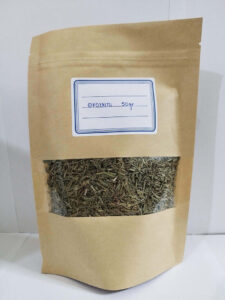Summer savory, aromatic plant with a distinctive aroma
Summer savory (Satureja thymbra – Lamiaceae) is a beautiful shrub with a strong aroma. It is a plant found in almost all temperate regions of the world. It has been known since ancient times and has been used in cooking as a flavouring for more than 2,000 years and also as an herb. The genus includes over a hundred annual or perennial plants and belongs to the family Lamiaceae.
It belongs to the family of chelants. The trunk is woody, with 2-4 rosy or whitish flowers and small egg-shaped seeds of a light brown colour with a pleasant odour. It reaches a height of 30-50 cm. It prefers sunny, rocky and calcareous soils. The flowers, the essential oil and, in some cases, the whole plant are useful. The essential oil contains active substances such as terpine, peycin, carbacrol, cymine, cineole and thymol.

The healing properties of the plant
The healing properties of the plant were known since ancient times. The fathers of herbal medicine and pharmacology, Theophrastus and Dioscorides, refer to it in their works. It has also been used for 2000 years in cooking, as it acts as a digestive and is considered ideal for all indigestible dishes. It has a strong flavour reminiscent of thyme and oregano. The ancient Greeks used to make wine flavoured with Throumbi, the Thymbrite wine. In many countries it is still added to this day to digestive liqueurs. During the Middle Ages, trubi was used as a decoction for sore throats, coughs, toothache and mouth sores, and as an absolution agent for various utensils, due to its antibacterial and antimicrobial properties.
In modern herbal medicine, thrombin is known mainly for its therapeutic properties in the digestive system. It acts as a digestive, stimulates the appetite, stimulates the body, helps in the treatment of diarrhoea, intestinal spasms, pains from colic, gastric atony, nervous indigestion, nausea and sourness. Its decoction helps to remove stomach gases, relieves bloating and contributes to good digestive function. It is also used as an expectorant. It softens coughs and is suitable for bronchitis and asthma. It can also be applied externally, as an antiseptic, to wounds and insect bites, as it provides immediate relief.
Summer savory and its uses
As an ornamental: It is a very popular plant that because of its fragrance and spherical shape, it is used in arid gardens alone and in groups even as a potted plant. It can also be used as a border plant in flower beds in the garden and in rock gardens.
As an aromatic: Its aromas are similar to thyme, rosemary and oregano. It is used for flavouring grilled meats and fish. It is very good in honey, wine, (thrummitis wine), vinegar, olives (thrumps), and in Epirus it even flavours cheese. In Crete they clean the cauldrons with trumpet before production, thus flavouring raki.
As an herb: Formerly it was used as an antidote to the stings of bees, wasps and other insects. Also as a decoction for sore throats, coughs and bronchitis. The essential oil has antifungal and antibacterial properties. The Romans considered thurible as an aphrodisiac herb and not without reason. Today, trumpet is also used as a tonic, digestive digestive and as an appetizer. It is even used in industry for flavouring soaps, toothpastes, etc.






Reviews
There are no reviews yet.